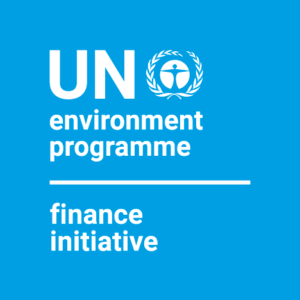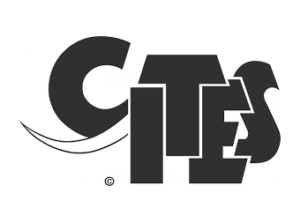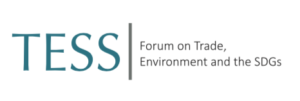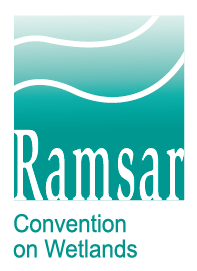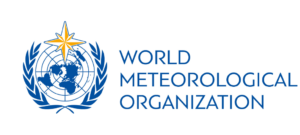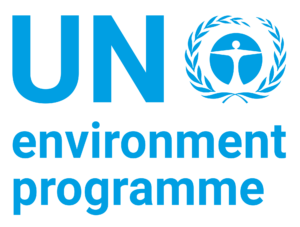Newsletter 02 Oct 2023
Environment: What’s Up in GENeva | 2 – 8 October 2023

The Geneva Environment Network’s weekly newsletter includes the latest information on the global environmental agenda, main events, job vacancies, learning opportunities, as well as other useful resources and updates. Stay tuned and follow us also on Twitter, Facebook, LinkedIn, and Youtube, or visit our website regularly for additional updates.
Image of the week | The President of the fifth International Conference on Chemicals Management President, Anita Breyer (Germany), striking the gravel as the assembly adopts the resolution on the Global Framework on Chemicals, for a planet free of harm from chemicals and waste, and the High-Level Declaration, at the closing plenary of the Conference, in Bonn, on Saturday 30 September 2023. Numerous stakeholders from International Geneva attended the Conference and made important contributions.
New Global Framework for a Planet Free of Harm from Chemicals and Waste
The fifth International Conference on Chemicals Management (ICCM5) made history on the morning of Saturday 30 September 2023 by adopting the Global Framework on Chemicals – For a planet free of harm from chemicals and waste, a High-Level declaration, and a series of additional resolutions. With the adoption of this Global Framework, chemicals, waste and pollution are recognized at the same level as the crises of climate change and nature and biodiversity loss, which already have frameworks in place.
The new Framework calls for more ambitious and urgent action by all stakeholders and sectors to protect present and future generations, as the global goal on chemicals management adopted at the World Summit on Sustainable Development in 2002 – to achieve, by 2020, that chemicals would be used and produced in ways leading to the minimization of significant adverse effects on human health and the environment – was not achieved. The Framework:
- sets concrete targets and guidelines across the life cycle of chemicals;
- aims to establish stronger connections with other important global agendas, including climate change, biodiversity, health, human rights, and occupational safety and health;
- calls for the prevention of the illegal trade and trafficking of chemicals and waste, the implementation of national legal frameworks, and the phase-out by 2035 of highly hazardous pesticides in agriculture;
- calls for the transition to safer and more sustainable alternatives, the responsible management of chemicals in various sectors – including industry, agriculture, and healthcare – and the enhancement of transparency and access to information regarding chemicals and their associated risks.
A decision was made to unlock financing for the implementation of the framework from different sources. A dedicated trust fund will be set up and managed by the United Nations Environment Programme. Into this fund, governments, the private sector, non-governmental organizations, and foundations can add to an initial EUR 20 million pledged by Germany, and EUR 400,000 by France. → Revisit the live coverage of the Conference on the IISD Earth Negotiations Bulletin.
Updates on Preparations for Minamata COP-5
One of the key upcoming negotiations to reflect on the adoption of the Global Framework on Chemicals will be the fifth meeting of the Conference of the Parties to the Minamata Convention on Mercury (COP-5), which will take place in Geneva, from 30 October to 3 November 2023, under the presidency of Romania. The Convention was adopted in October 2013 to address mercury, a heavy metal that is persistent in the environment. While naturally occurring, mercury has broad uses in everyday objects and is released to the atmosphere, soil, and water from a variety of sources. Controlling the anthropogenic releases of mercury throughout its lifecycle has been a key factor in shaping the obligations under the Convention. This week, a briefing to be opened by the President of the Conference, Claudia Dumitru, will provide updates on preparations for COP-5, including an overview of logistical aspects and the online events. Invited stakeholders’ will also provide their perspectives. → Register to attend in person at the International Environment House I or online on Webex the event taking place on Thursday 5 October 2023 from 14:00–15:30 CEST.
As part of the preparations for the meeting, online events will take place from 9 to 13 October 2023, the week marking the 10th anniversary of the adoption of the Minamata Convention. The Geneva Environment Network will co-host three sessions:
- Science-Policy Panel on Chemicals, Waste and Pollution Prevention: Building the Linkages from Science to Action | Minamata COP-5 Online Event / Road to OEWG 2 Series | 09 Oct 2023, 13:00 – 14:00 CEST
- Catalyzing Project Impact and Visibility Through Knowledge-Driven Capacity-Building | Minamata COP-5 Online Event | 10 Oct 2023, 14:45 – 15:45 CEST
- Advancing a Rights-based Approach to Addressing Mercury Contamination | Minamata COP-5 Online Event | 11 Oct 2023, 16:30 – 17:30 CEST
Supporting the Plastics Treaty Negotiations
Another major upcoming negotiation to reflect on the adoption of the Global Framework on Chemicals, will be the third session of the Intergovernmental Negotiating Committee to develop an international legally binding instrument on plastic pollution (INC-3). With less than two months before the opening of INC-3, new studies, reports, and statements are raising the momentum and advancing work during the intersessional period. Recent updates include:
- Nordic Council of Ministers for the Environment and Climate Report | Towards Ending Plastic Pollution by 2040 — defines 15 far-reaching policy interventions across the plastic lifecycle and estimates its impact on plastic stocks and flows (including virgin plastic production, consumption, circularity, controlled disposal, mismanaged plastics and releases into the environment), GHG emissions, costs, and jobs.
- ILO Research Report | Hazardous exposures to plastics in the world of work — highlights how workers in numerous industries use plastics during the course of their work and may therefore be at risk of harmful chemical exposures, depending on the variety of plastic and type of exposure.
- TESS and ISO Report | Standards and Related Initiatives in International Cooperation to End Plastic Pollution: Mapping and State of Play — on the relevance of standards and standard-setting processes to support plastics treaty negotiations.
- CIEL Brief | Reducing Plastic Production to Achieve Climate Goals: Key Considerations for the Plastics Treaty Negotiations — highlights that to effectively address the climate impacts of plastics, the global plastics treaty needs to incorporate ambitious obligations that specifically target global plastic production.
- New rules under the EU chemical legislation REACH | New measures to restrict intentionally added microplastics — the new rules will prevent the release to the environment of about half a million tonnes of microplastics and prohibit the sale of microplastics as such, and of products to which microplastics have been added on purpose and that release those microplastics when used.
- TESS | Statement at WTO Dialogue on Plastics Pollution Meeting — WTO Ministerial Statement will be successful if it catalyzes and captures commitments to concrete action, provides direction for future work, signals momentum, and illustrates the capacity for cooperation on trade and trade policy at the WTO to respond to urgent global challenges.
- Plastics Treaty Zero Draft | Now available in all UN languages on the INC website.
Relevant events discussing the upcoming INC-3 taking place this week include:
- INC Secretariat Webinar 6: Targets, national plans, and national implementation | This session will provide an opportunity to consider the role played by national plans and other forms of national commitments towards the achievement of the objectives of multilateral environmental agreements and the implementation of obligations under such agreements. → Register to attend on Zoom on 3 October 2023 from 15:00 – 16:30 CEST.
- FAO Geneva Second Webinar on the Role of Plastics in Agriculture | This briefing will discuss the outcomes of INC-2; inform on the mandate for a zero draft of the Treaty and their implications for the agriculture sector; and explore concrete solutions to address plastic use and waste in agriculture through country examples and best practices. → Register to attend the event taking place at Palais des Nations | Room H/5-542 – H.542 on 3 October 2023 from 15:30 to 16:45 CEST.
- CIEL, EIA, and GRID-Arendal Webinar | The Environmental Investigation Agency, the Center for International Environmental Law, and GRID-Arendal will host a webinar “Aligning the plastics treaty with climate goals: The role of production controls” to provide an overview of different perspectives on how the plastics treaty should align to the climate goals and beyond, and the role and importance of production controls to achieve that. → Register to attend on Zoom the event taking place on 5 October 2023 from 16:00 to 17:00 CEST.
Next week, the co-conveners of the Geneva Beat Plastic Pollution Dialogues will host a Briefing on the 3rd Session of the Intergovernmental Negotiating Committee to Develop an International Legally Binding Instrument on Plastic Pollution (Plastic Pollution INC-3), presenting the status of preparations, taking stock of relevant documents such as the zero draft and offering stakeholders an opportunity to present perspectives on the process. → Register to attend the event on 12 October 2023 from 14:00 – 15:30 CEST.
Environment @ Human Rights Council
The environment remains high on the agenda of the 54th session of the Human Rights Council (HRC54), as it continues onto its 4th week. Events of interest this week include:
- Youth participation in climate-related action | Side Event | Caritas Internationalis | 2 October 2023 | 16:00 – 17:00 CEST | Room XXV, Palais des Nations & Online
- Climate Change, Gender Equality, and Empowerment of Women | Side Event | UAE, General Secretariat of League of Arab State & UN Women Office in Abu Dhabi | 3 October 2023 | 14:00 – 15:00 CEST | Room XXV, Palais des Nations & Online
Last week, the rights of Indigenous Peoples were a central point for discussion at the Council as the UN Special Rapporteur on the rights of Indigenous Peoples presented his report “Green financing – a just transition to protect the rights of Indigenous Peoples“. In his report, he highlighted:
- Green financing, though necessary and urgent, has an important human rights dimension. If done using a human rights-based approach, it can be a source for Indigenous Peoples to obtain funding to preserve their plans, knowledge, and distinct ways of life.
- Actors, such as financial decision-makers, in urgent green financing must recognize and uphold the rights of Indigenous Peoples by demanding social and environmental safeguards and effective due diligence protocols to ensure participation, and by making them central in plans.
- A just green transition must involve Indigenous Peoples, especially Indigenous women, in financial processes through accessible resources for land tenure or direct funding, and ensuring meaningful consultation.
Climate change was also in the spotlight as the Council held a biennial panel on youth and human rights, particularly on “Young people’s engagement with climate change and global environmental decision-making processes”, as well as an interactive dialogue with the Council’s Advisory Committee on their report “Impact of new technologies intended for climate protection on the enjoyment of human rights“.
- The biennial panel highlighted that though the world is home to the largest generation of young people in history at 1.8 billion, the youth face multiple barriers when they seek to engage in global climate change and environmental decision-making processes, including tokenism and the lack of access to resources to participate. True inclusion means having “accountability, transparency, and honesty”, as well as considering the specific challenges and opportunities for Indigenous, afro-descendants, LGBTQ+, farmers, environmental human rights defenders, and rural young people.
- The Advisory Committee concluded in its report that new technologies aimed at protecting the climate interfere with the enjoyment of various human rights due to the high degree of scientific uncertainty on how these are applied or their side effects. Human rights norms and obligations require that we adopt the precautionary approach and justify the establishment of a moratorium on these speculative technologies while the scientific uncertainties surrounding their impacts and use continue to exist and while there is a high risk of causing major and irreversible damage to the environment and human beings.
→ Our update on HRC54 provides the latest news and highlights the environmental-related activities of this session.
Urban October | Promoting a Better Urban Future
Urban October is a month of activities, events, and discussions around urban sustainability, organized yearly by UN-Habitat and partners, and an opportunity to foster dialogue at the global and local levels about the challenges and opportunities created by the fast rate of change in our cities and towns. The month kicks off with World Habitat Day on the first Monday of October and ends with World Cities Day on 31 October. This year, the focus is on SDG 11, “Make cities inclusive, safe, resilient and sustainable”, recognizing cities as centers for economic growth and development that also face demographic, environmental, economic, and social challenges.
The Global Observance of World Habitat Day on Monday, is held under the theme “Resilient urban economies. Cities as drivers of growth and recovery”, and focuses on how cities can position their economies to benefit residents. The official celebration will take place in a hybrid format, in Baku, Azerbaijan.
This week in Geneva, the Urban Resilience Week, hosted by UNECE in the context of Urban October, will bring together representatives of national and subnational governments, experts, and civil society representatives from the region and beyond to discuss strategies and solutions for building more resilient and sustainable cities. The Global Cities Hub (formerly Geneva Cities Hub) is one of the key Geneva-based institutions to be engaged in this week’s programme of activities which includes:
- Third Forum of Mayors | Palais des Nations, Room XVII | 2- 3 October
Organized by UNECE, the Forum of Mayors brings together city leaders from across the region and beyond to address the key challenges of our time. At the third Forum of Mayors, focusing on “Urban regeneration towards 2030”, mayors will discuss urban regeneration projects to achieve more inclusive, resilient and sustainable urban development. - 84th session of the UNECE Committee on Urban Development, Housing, and Land Management | Palais des Nations | 4-6 October 2023
The session supports regional exchange of experiences and good practices on promoting affordable, adequate and climate-neutral housing and inclusive, circular, smart and sustainable cities. - Side Events
Melting of Glaciers and Sea Ice
The years 2022 and 2023 have been disastrous for Swiss Glaciers, cumulatively destroying 10% of their total volume. The findings unveiled by the Swiss Academy of Sciences (SCNAT), explain this phenomenon as a combination of little precipitation and high temperatures especially during the summer. The two extreme consecutive years have led to glacier tongues collapsing and the disappearance of smaller glaciers, such as the St. Annafirn Glacier in the canton of Uri. → Find more resources and information on Unprecedented Rates of Mountain Glacier Melting | Glaciers and the Role of Geneva
Want to discover the longest ice stream in the Alps? Ahead of the International Film Festival on Glacier annual event in Geneva (1-3 December 2023), bringing awareness to the public on the challenges faced by the world glaciers, the Association Mission Planète Terre is organizing an excursion to the Great Aletsch Glacier, on 14 to 15 October, open to all. → Register online to join the excursion (limited places)
Massive loss of ice has been affecting also the Antarctic region, with sea ice reaching the lowest winter extent on record. This absence of sea ice is associated with unseasonably warm sea-surface temperature across the Southern Ocean as well as warmer atmospheric surface temperature over much of wider East Antarctica and associated adjustment of the large-scale atmospheric circulation over the Antarctic. Scientists with WMO’s Global Cryosphere Watch and the wider research community are monitoring whether this is part of the normal variability around the windswept frozen continent or whether it is the start of a new, worrying state as a result of excess greenhouse gases in the atmosphere and ocean. Already visible impacts include the unprecedented breeding failure experienced by Emperor penguin colonies in Antarctica’s region.
Fourth Edition of Building Bridges
The fourth edition of Building Bridges, a joint initiative launched in 2019 by Swiss public authorities, the finance community, the United Nations and other International partners, will take place at the Centre International de Conférences Geneva (CICG) and online, from 2 to 5 October 2023. In line with its mission of accelerating the transition to a global economic model aligned with the SDGs, Building Bridges will feature various high-level plenaries and dialogues, interactive spaces, and workshops. → Visit the official website to learn about the program and registration modalities.
Among the many actors participating in this edition, UNEP FI as a founding partner of Building Bridges, will be taking part in the Summit Plenaries and Action Day sessions talking about new recommendations related to the Task Force on Nature-related Financial Disclosures, as well as sustainable insurance. → Read more on Sustainable Finance in Geneva.
Suggestions for a Green Autumn in Geneva
In Switzerland, September 2023 will go down in history because of the temperature records. It was the hottest ever measured, and October begins with unprecedented heat, especially in mountain regions. While nature will be changing colors in the coming weeks, Geneva offers many opportunities to enjoy its landscapes around the lake and its numerous parks. Find suggestions of exhibitions, nature trails, shows, music, and festivals for a Green Autumn in Geneva.
What (Else) to Read Next?
- Review of Maritime Transport 2023 | UNCTAD | 27 September 2023
UNCTAD’s Review of Maritime Transport 2023 calls for a “just and equitable transition” to a decarbonized shipping industry. The sector, whose greenhouse gas emissions have risen 20% over the last decade, operates an ageing fleet that runs almost exclusively on fossil fuels.
- Net Zero Roadmap: A Global Pathway to Keep the 1.5 °C Goal in Reach (2023 Update) | IEA | 26 September 2023
The 2023 update to our Net Zero Roadmap surveys this complex and dynamic landscape and sets out an updated pathway to net zero by 2050, taking account of the key developments that have occurred since 2021. - UN toxics expert: climate action no good if it poisons the planet | Geneva Solutions | 25 September 2023
In his latest report presented to the Human Rights Council on 19 September, UN special rapporteur on toxics and human rights Marcos Orellana warns about the environmental consequences of climate action when done without safeguards. - At Historic ITLOS Hearings, States Stake Out Positions on Climate Duties and Ocean Protection | Joie Chowdhury | September 2023
After two weeks, public hearings at the International Tribunal for the Law of the Sea (ITLOS) in relation to the request for its Advisory Opinion on climate change and international law concluded on 25 September 2023. These legal proceedings, initiated by the Commission of Small Island States on Climate Change and International Law (COSIS), have the potential to advance ambitious climate action after decades of political inertia that have plagued international climate negotiations and domestic climate policies.
Events
See all
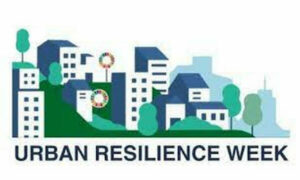



Workshop
Observations Within The Global Greenhouse Gas Watch
03 – 05 Oct 2023
WMO | alle Obasi & Online | Zoom
WMO
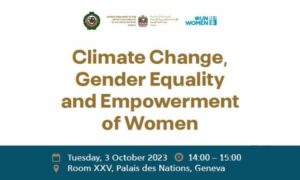
Conference
Climate Change, Gender Equality and Empowerment of Women | HRC54 Side Event
03 Oct 2023 14:00 – 15:00
Palais des Nations | Room XXV,
United Arab Emirates, UN Women

Conference
Outcomes of INC-2 and Solutions to Address Plastic Pollution in Agriculture
03 Oct 2023 15:30 – 16:45
Palais des Nations | Room H-542
FAO

Body Meeting
Climate Policy Advisors | Policy Advisory Committee (PAC) 2023
04 Oct 2023 14:00 – 17:00
Online
WMO
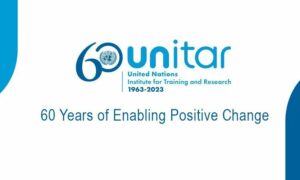
Conference
Youth Climate Dialogue | UNITAR’s 60th Anniversary Celebration
04 Oct 2023 09:00
Palais des Nations | Room XVII
UNITAR

Body Meeting
Informal Open-ended Negotiating Group on Rules | Fisheries Subsidies
04 Oct 2023 10:00
WTO | Room D
WTO

Conference
Forum Mobilité 4e édition | Villes mobiles
04 Oct 2023 16:30 – 20:00
Campus HEAD
TPG, Le Temps


Conference
Briefing on the 5th Meeting of the Conference of the Parties to the Minamata Convention on Mercury
05 Oct 2023 14:00 – 15:30
International Environment House I, Room 2 & Online | Webex
Minamata Convention on Mercury, GEN

Body Meeting
Informal Open-Ended Committee on Trade and Environment
06 Oct 2023 10:00
WTO | Room S1
WTO
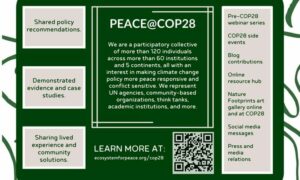
Virtual
Addressing the Root Causes: Taking action on military spending and emissions to advance climate, gender justice, and peace | Peace @COP28
05 Oct 2023 14:00 – 15:00
Geneva Peacebuilding Platform

Aligning the plastics treaty with climate goals: The role of production controls
05 Oct 2023 16:00 – 17:00
Online | Zoom
CIEL, EIA

Informal Open-ended Negotiating Group on Rules | Fisheries Subsidies
06 Oct 2023 14:00
WTO | Room S3
WTO

Exhibition
Opening Ceremony of UNITAR’s 60th Anniversary Photo Exhibition
06 Oct 2023 16:00 – 17:00
Rotonde du Mont-Blanc Quai du Mont-Blanc
UNITAR

Jobs
See all
